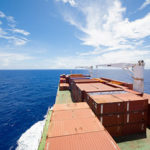The Ministry of Oceans and Fisheries proposed the use of container ships to export new cars in order to support automobile exports, as some car producers have cars to sell, but no way to ship them.
Especially for SsangYong Motor and Renault, reserving enough space on chartered ships is key in continuing their momentum with exports.
Ssangyong Motor announced its first quarterly operating profit in six years in its earnings guidance released on Jan. 18. The long-waited turnaround was supported by the sale of 33,502 cars in the fourth quarter and 113,960 cars in the year, with 45,294 sold overseas.
The company is finding it difficult to ship its products abroad.
“We have the export capacity, but car carrier vessels are hard to find,” a spokesperson for Ssangyong Motors said Wednesday. “Our partner shipping company has no room for more.”
A full month has passed this year, but the carmaker is yet to announce its yearly export target due to the car carrier shortage.
Renault sold 117,020 cars overseas last year. This figure was a 63.3 percent on-year increase, and more than twice the number of domestic sales, which was 52,621.
Renault’s exports may come to a halt with the shortage of chartered car carriers and high charter rates.
“We’re like an airline looking for a chartered plane for each flight,” a spokesperson for Renault said.
The shortage of car carriers is a worldwide phenomenon, according to the Oceans and Fisheries Ministry.
There were 770 car carrier vessels across the world before the pandemic, but the number now stands at 750 as several of them were decommissioned due to decreasing shipbuilding contracts and tightening environmental regulations.
Fewer carriers meant higher charter rates. The price for chartering a carrier vessel with a 6,000 CEU capacity, or the capacity to carry 6,000 cars, per day was 24 million won ($20,000) in 2021, but that rose to 123 million won in the second half of last year.
“Charter rates are stabilizing this year,” a source from the shipping industry said. “But car producers with no long-term contracts will suffer for the time being.”
To provide a breather for companies with no long-term contracts, such as Ssangyong Motor and Renault, the Ministry of Oceans and Fisheries proposed to ship cars on container ships as an alternative.
“We will closely coordinate with national shipping companies to provide a cost-competitive alternative for the car industry,” the Oceans Ministry announced in its report released on Jan. 27. Oceans Minister Cho Seung-hwan hosted a meeting with industry executives, including those from Ssangyong and Renault, Korea Ocean Business Corporation and Korea Shipowners’ Association on the previous day.
“For Far East-Europe routes where the shortage is most intense, freight space of the container vessels may be designated to carry exporting cars,” the ministry added.
Car carriers have multiple floors of decks to store cars, which makes the carrier to have high side walls and look tall above the surface. Container ships are relatively flat and sail with thousands of 12-meter-long (40 feet) or 6-meter-long container boxes.
The Oceans Ministry said it will also coordinate with port authorities to ease restrictions on car containers to secure more storage space for exporting cars.
Source: Hellenic Shipping News





